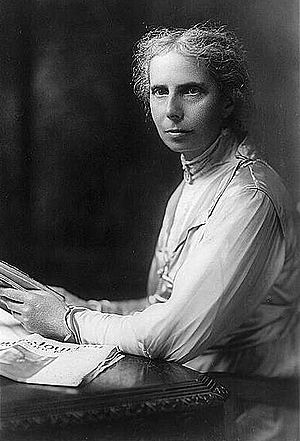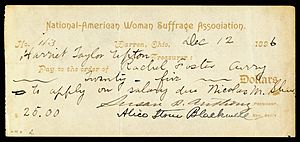Alice Stone Blackwell facts for kids
Quick facts for kids
Alice Stone Blackwell
|
|
|---|---|

Alice Stone Blackwell, between 1880 and 1900
|
|
| Born | September 14, 1857 |
| Died | March 15, 1950 (aged 92) |
| Resting place | Forest Hills Cemetery, Boston, Massachusetts |
| Nationality | American |
| Alma mater | Boston University |
| Movement | Feminism Radical socialism |
| Parent(s) | Lucy Stone Henry Browne Blackwell |
Alice Stone Blackwell (born September 14, 1857 – died March 15, 1950) was an important American woman. She was a feminist, meaning she believed in equal rights for women. She was also a suffragist, which means she worked hard to get women the right to vote. Besides that, she was a journalist, a supporter of social justice, and a champion for human rights.
Contents
Early Life and Education
Alice Stone Blackwell was born in East Orange, New Jersey. Her parents were Henry Browne Blackwell and Lucy Stone. Both of her parents were leaders in the movement to get women the right to vote. They even helped start a group called the American Woman Suffrage Association (AWSA).
Alice's aunt was Elizabeth Blackwell, who was America's very first female doctor. Her mother, Lucy Stone, was a truly amazing woman. She was the first woman in Massachusetts to earn a college degree. She was also the first married woman to keep her own last name. Plus, she was the first woman to work full-time speaking about women's rights. She even introduced Susan B. Anthony to the women's rights movement!
Alice went to several schools, including Harris Grammar School and the Chauncy School. She later attended Boston University. She was the president of her class and graduated in 1881 when she was 24 years old. She was also part of a special academic honor society called Phi Beta Kappa Society.
Fighting for Women's Rights
Alice Stone Blackwell is famous for her work in women's rights. Even though she wasn't sure about joining the cause at first, she later became a very important leader. After finishing college, Alice started working for the Woman's Journal. This newspaper was started by her parents to share news about women's rights. By 1884, her name was listed as an editor alongside her parents. After her mother passed away in 1893, Alice became the main editor of the newspaper.

In 1890, Alice helped bring together two big groups that were working for women's right to vote. These groups, the American Woman Suffrage Association (AWSA) and the National Woman Suffrage Association, had been separated since 1869. They had disagreed about whether women's voting rights should be linked to African-American men's voting rights. Alice helped them join forces to create the National American Woman Suffrage Association (NAWSA).
From 1890 to 1908, Alice Stone Blackwell was the recording secretary for NAWSA. This meant she kept important records for the group. In 1909 and 1910, she was one of their national auditors, checking their finances. She was also active in the Woman's Christian Temperance Union, a group that worked to reduce alcohol use. In 1903, she helped restart the Society of Friends of Russian Freedom in Boston.
Alice also served as president of the New England and Massachusetts Woman Suffrage associations. Later, she became an honorary president of the Massachusetts League of Women Voters.
In her later years, Alice became blind. She passed away on March 15, 1950, at the age of 92. Her childhood home in Uphams Corner is now part of the Boston Women's Heritage Trail.
Helping People Around the World
Alice Stone Blackwell also helped people outside of the United States. In the 1890s, she traveled to Armenia. There, she became deeply involved in helping Armenian refugees. These were people who had to leave their homes because of conflict.
Alice sold some of her own belongings, like special rugs from her house, to help the Armenians. She used the money to feed children and help adults find jobs. This experience also sparked her interest in international literature. She translated many Armenian poems into English, publishing them in a book called Armenian Poems (1896). She continued to translate poetry from many other languages, including Hungarian, Yiddish, Mexican, French, Italian, and Russian.
Images for kids
See also
 In Spanish: Alice Stone Blackwell para niños
In Spanish: Alice Stone Blackwell para niños



